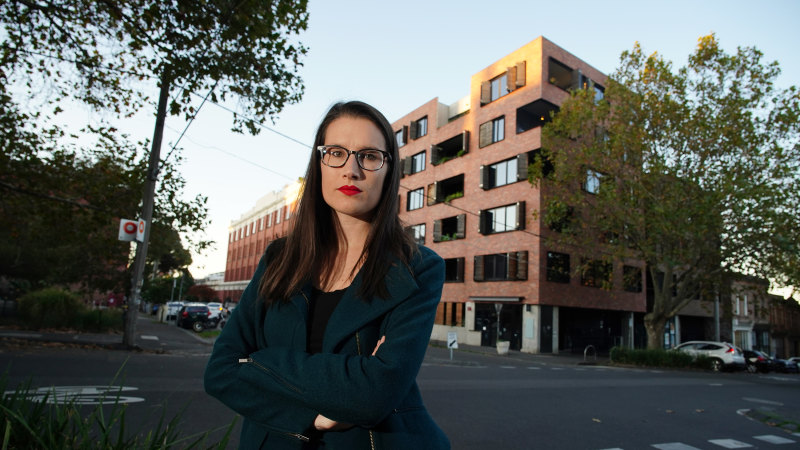Save articles for later
Add articles to your saved list and come back to them any time.
The City of Yarra should consider taxing Airbnb hosts to incentivise landlords to lease their homes on the private rental market or sell up to ease the housing crisis, according to a Greens councillor.
Annual council charges for short-term accommodation hosts already exist in Bass Coast Shire, Frankston, Mornington Peninsula and most recently Warrnambool Shire, but no inner-city councils have yet moved to regulate Airbnb properties.
Yarra councillor Sophie Wade wants the council to look at options to tax Airbnb hosts.Credit: Luis Ascui
Greens councillor Sophie Wade will at Tuesday night’s council meeting present a motion requesting the City of Yarra investigate the merits of introducing regulations – such as fees, registration or nightly caps – on short-term accommodation in the municipality, which takes in the suburbs of Richmond, Abbotsford, Fitzroy and Collingwood.
“In the face of a cost-of-living and rental crisis, and in a city where 50 per cent of our population rents, it is worth Yarra Council and the Yarra community considering options in this space,” Wade’s motion reads.
The councillor bought her first home in the City of Yarra – an apartment that was previously operated as an Airbnb.
“I’m a first home owner who bought something that someone offloaded. I’m the case study of the exact kind of thing I’m trying to achieve with this motion,” she said.
According to open-source database Inside Airbnb, there were 1608 properties available in the City of Yarra on Airbnb in March this year. According to census data, there are almost 50,000 dwellings in Yarra.
About 80 per cent of the Airbnb properties listed are listings of entire homes, and 34.5 per cent of hosts had multiple listings.
In November 2021, the NSW government introduced short-stay regulations, limiting the number of days a property could be on the market to 180 days of the year and no more than three consecutive months. It has recently extended the rules to other regional areas.
No such laws have been introduced in Victoria. The Victorian Greens have called on the Andrews government to introduce a 90-day cap, a public register of short-stay providers and more powers for owners corporations to regulate Airbnbs in their buildings.
Victorian councils with rules on short-stay accommodation already
- Bass Coast Shire: Compulsory $300 annual registration fee and owners must enforce a code of conduct for guests (including no use of outdoor areas such as swimming pools and balconies between 11pm and 7am).
- Frankston City Council: Compulsory $150 annual registration fee and owners must enforce a code of conduct for guests.
- Mornington Peninsula Shire Council: Compulsory $311 annual registration fee and owners must enforce a code of conduct for guests.
- Warrnambool Shire Council: Compulsory $400 annual registration fee and owners must enforce a code of conduct for guests.
“I would really welcome state involvement in this, but if the state government is not acting, then I want to know what Yarra can do to solve the problem ourselves,” Wade said.
Collingwood Airbnb host Jane Blair said it would be “pretty outrageous” if the council made any move to dictate to owners how they could use their properties.
The 33-year-old was living in her apartment, then moved in with a partner and listed her property on Airbnb. She said renting out her home on the private market to a long-term tenant would not cover her mortgage repayments now that interest rates had risen.
“I’m self-employed, it’s my property and my retirement plan basically,” she said.
But Blair said she would be “happy to pay a small fee” to run her Airbnb, if the revenue raised by council went towards helping people in crisis.
Cities around the world are cracking down on Airbnbs: New York no longer allows full homes to be rented on the platform, London has a 90-night cap and Philadelphia requires hosts to obtain a hotel licence.
“The most important thing is people’s right to have a safe and affordable home is more important than people’s right to an investment,” Wade said.
Michael Crosby, head of public policy for Airbnb in Australia and New Zealand, said neither the company “nor host community” was opposed to regulation, but wanted it to come from state government.
“We support the introduction of statewide frameworks – which includes registration and a code of conduct – rather than a council-by-council approach,” he said.
“Housing affordability is a challenging and complicated issue. The causes differ from place to place, with legacy factors – which often pre-date the founding of Airbnb by decades – ranging from the supply of new homes, the ratio of public housing, the number of empty dwellings and rooms, interest rates and broader economic conditions.
“Airbnb supports the introduction of opt-in tourism levies to fund much-needed community infrastructure and services — for example, key worker housing projects — in communities across Australia.”
Yarra Ranges Council has previously asked the state government to step in and regulate short-term accommodation, as has the Victorian Tourism Industry Council and Accommodation Association over concerns about a lack of housing supply for local workers.
The Greens lost their majority hold of the City of Yarra council last year after former Mayor Gabrielle de Vietri was elected to the Victorian parliament.
A spokeswoman for the Victorian government did not answer whether the government was considering any further regulation of the sector, but instead pointed to a 2019 change to the Owners Corporation Act that allows action against Airbnb owners and guests when common property gets damaged.
“We have introduced laws to limit disruption caused by unruly short-stay guests in apartments, and continue to monitor the wider impacts of the sector,” she said.
The Morning Edition newsletter is our guide to the day’s most important and interesting stories, analysis and insights. Sign up here.
Most Viewed in National
From our partners
Source: Read Full Article

